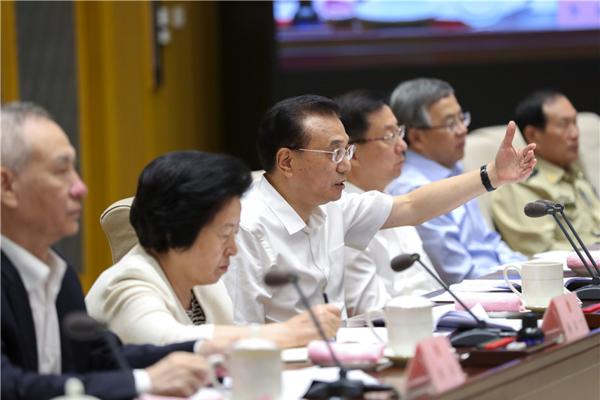
Premier Li Keqiang delivers a speech at a national teleconference on streamlining administration, June 28.
Premier Li Keqiang said at a State Council executive meeting on July 18 that the target of streamlining administration and delegating powers will not be fulfilled unless the market is massively boosted and people sufficiently motivated.
Greenlighting dispensable approvals are nothing but going through the motions, and only by taking concrete measures catering to people’s concerns can the government bring reform into fruition. Hence the final say is with the market and people, the Premier said.
China will further optimize the business environment, Premier Li added, bring the vigor of the market and people into full play, and maintain an unswerving focus on their concerns. A fair playing field of the market is in order, with certain rights delegated to the market.
Market entitled to autonomy
Against the backdrop of fierce international competition, efforts should be made to accelerate the progress of administration streamlining, power delegation, and optimization of the business environment, Premier Li said.
Structural tax reduction and business environment optimization form a two-pronged approach to deepen the reform and better mediate the relations between the government and enterprises, in a bid to build a strong appeal to enterprises, both domestic and foreign ones, he added.
Gone are the days when enterprises were stymied by tiresome red tape, covering countless procedures for licenses, approvals and filing. It’s time to hit the nail on the head, with the government delegating powers to the market entities, letting the market play a decisive role in distributing resources, the Premier said.
Decisions were made at the meeting that a pilot project of business environment assessment will be introduced and eventually launched nationwide, with local authorities responsibilities fully outlined and positive incentives beefed up.
Online governmental service platforms will be introduced in more regions on a large scale, featuring one-stop services, Internet Plus medical services, and more.
The market entities and people have the word of the government, hence departments concerned should speed up the formulation of related measures, Premier Li said.
Benefit the people and market entities
Many administrative permits, which seem to be easy with small charges, may pose great difficulties for market entities and the people, Premier Li said, urging continuous efforts to improve the business environment by respecting market entities and streamlining procedures.
It was decided at the meeting that another 17 administrative permits will no longer be required, including for establishing a nursing home for the elderly, declaring the invalidity of business licenses, project approval for foreign businesses to invest in road transport, and work permits for Taiwan, Hong Kong and Macao residents to work on the mainland. Six of the above 17 items will be revoked through applying for legal revisions.
“The administrative permits canceled are specific moves to delegate powers to market entities. The government should strengthen supervision to arouse people’s enthusiasm,” the Premier said.
The Shanghai pilot free trade zone (FTZ) established in 2013 was an example of the reform to stimulate market vitality and give full play to the people’s initiative.
It turned out that within a year after the Shanghai FTZ was inaugurated, the number of registered enterprises had surpassed the total of the past two decades. The experience of the 28-square-kilometer FTZ has been replicated in other FTZs and even the whole country.
Instead of the transfer of powers between different departments, the reform is to bring substantial benefits to the people and market entities, he said.
Address the practical concerns of the people and market entities
“In this networked society, the people and market entities can judge government work through various channels, and we should pay high attention to their voices,” Premier Li said.
Prompt response to social concerns is a distinctive feature of a modern government, he said, calling for departments and local governments to learn about and address the people’s practical concerns.
